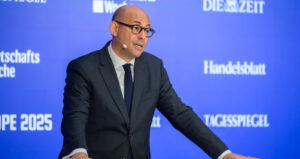 In a recent speech at the “Europe 2025” conference in Berlin, UN Climate Change Executive Secretary Simon Stiell emphasized the urgent need for the European Union (EU) to advance its climate agenda, framing robust climate policies as essential for economic security. He warned that climate-induced disasters such as unprecedented storms, heatwaves, droughts, and floods—are already causing significant damage across Europe, leading to reduced food production, infrastructure destruction, and heightened costs for households and businesses.
In a recent speech at the “Europe 2025” conference in Berlin, UN Climate Change Executive Secretary Simon Stiell emphasized the urgent need for the European Union (EU) to advance its climate agenda, framing robust climate policies as essential for economic security. He warned that climate-induced disasters such as unprecedented storms, heatwaves, droughts, and floods—are already causing significant damage across Europe, leading to reduced food production, infrastructure destruction, and heightened costs for households and businesses.
Stiell highlighted the potential economic repercussions, noting that climate impacts could reduce the EU’s combined GDP by up to 1% in the coming years and by as much as 2.3% by mid-century. Such declines could lead to a cycle of permanent recession, characterized by shrinking economies, failing businesses, and increased unemployment. He stressed that these projections are conservative and do not account for broader societal and ecological damages, including potential shortages of food, water, and energy.
In this context, Stiell presented the EU’s new climate plan as a pivotal strategy not only for environmental sustainability but also for securing economic stability. He argued that proactive climate action is the most effective safeguard against the economic threats posed by climate change, positioning a strong climate plan as the “strongest form of economic security guarantee.” His address underscores the critical intersection of climate policy and economic health, advocating for integrated strategies that address environmental challenges while promoting economic resilience. His call to action reflects a broader consensus that addressing climate change proactively is essential for safeguarding both the planet and the global economy.
Source: UNFCCC
